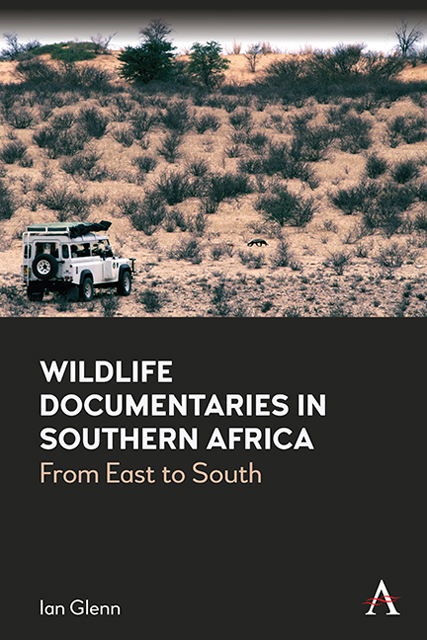Book contents
- Frontmatter
- Dedication
- Contents
- List of Figures
- Acknowledgements
- Introduction
- Chapter 1 What do the Critics Say?
- Chapter 2 A Theoretical Coalition?
- Chapter 3 Gone South: From East to Southern Africa
- Chapter 4 Private Lodges, Infrastructures and Guides
- Chapter 5 Going South: The Results
- Chapter 6 The Early History
- Chapter 7 The South Africans Enter the Game
- Chapter 8 Michael Rosenberg and Partridge Films
- Chapter 9 David and Carol Hughes
- Chapter 10 The Bartletts in the Namib, the Liversedges in Botswana
- Chapter 11 John Varty, Elmon Mhlongo and Londolozi
- Chapter 12 Richard Goss and Kim Wolhuter
- Chapter 13 Dereck and Beverly Joubert
- Chapter 14 Other Major Contributors
- Chapter 15 Going Live: Africam And Wildearth
- Chapter 16 Craig and Damon Foster
- Chapter 17 Must Love Animals?
- Chapter 18 The Social Turn
- Chapter 19 The Future of the Genre
- Chapter 20 The Influence of the Genre
- Conclusion
- Filmography
- Plates
- References
- Index
Chapter 1 - What do the Critics Say?
Published online by Cambridge University Press: 10 January 2023
- Frontmatter
- Dedication
- Contents
- List of Figures
- Acknowledgements
- Introduction
- Chapter 1 What do the Critics Say?
- Chapter 2 A Theoretical Coalition?
- Chapter 3 Gone South: From East to Southern Africa
- Chapter 4 Private Lodges, Infrastructures and Guides
- Chapter 5 Going South: The Results
- Chapter 6 The Early History
- Chapter 7 The South Africans Enter the Game
- Chapter 8 Michael Rosenberg and Partridge Films
- Chapter 9 David and Carol Hughes
- Chapter 10 The Bartletts in the Namib, the Liversedges in Botswana
- Chapter 11 John Varty, Elmon Mhlongo and Londolozi
- Chapter 12 Richard Goss and Kim Wolhuter
- Chapter 13 Dereck and Beverly Joubert
- Chapter 14 Other Major Contributors
- Chapter 15 Going Live: Africam And Wildearth
- Chapter 16 Craig and Damon Foster
- Chapter 17 Must Love Animals?
- Chapter 18 The Social Turn
- Chapter 19 The Future of the Genre
- Chapter 20 The Influence of the Genre
- Conclusion
- Filmography
- Plates
- References
- Index
Summary
Introduction
While industry awards and insider accounts suggest, contra Wikipedia, that Southern African locales and filmmakers have been central to the genre in the past half-century, what have academics made of their contribution? In spite of its reach, there is almost no criticism within Southern Africa of the genre or its major figures or of Southern African practitioners from international critics. Part of the difficulty – and appeal – of doing this study is that there is so little scholarly material. Hundreds of millions, probably billions, of people may have watched and been influenced by these films, but there is hardly any analysis of them.
Studies of African Wildlife Documentary
The late Jean Hartley wrote the only book on African wildlife documentary: Africa’s Big Five and Other Wildlife Filmmakers (Hartley 2010). She had an unparalleled insider’s sense of the industry because she acted for a quarter of a century as the leading ‘fixer’ or local agent, based in Nairobi, for many British and American film crews wanting to film in Kenya or elsewhere in East Africa. She also had what must have been the world’s leading private collection of wildlife films on DVD and video as well as a large collection of books on wildlife film. When I visited her in Nairobi, she generously gave me access to her collection of filmed material and shared her insights and recollections.
Her major claim, as the title indicates, is that five major figures emerge as the most distinguished practitioners of African wildlife documentary: Des Bartlett, Alan Root, Bob Campbell, Simon Trevor, and Hugo van Lawick. (Only Van Lawick makes it onto Wikipedia.) What distinguishes these figures was that they settled in East Africa and worked there for long periods, knowing the animals and terrain intimately and often innovating in trying to find new ways of filming, as in Alan Root’s balloon trips or underwater contraption to film hippos at Mzima Springs.
Hartley quotes David Attenborough explaining why he did not try to make television programmes in East Africa: ‘I realized I was on a hiding onto nothing, with people like Armand Denis and Alan Root actually living there and being able to devote far more time than I could’ (99).
- Type
- Chapter
- Information
- Wildlife Documentaries in Southern AfricaFrom East to South, pp. 15 - 22Publisher: Anthem PressPrint publication year: 2022

